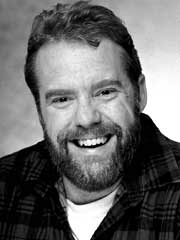| The Bear behind “A Bear’s Story”: an interview with filmmaker Kevin Bowe by Ron Suresha |

Kevin Bowe has been involved in “show biz” for almost thirty years. Starting his career as a child actor, Kevin has seen it all: musical theatre, stage, opera, cabaret, television, and film. Most recently, he wrote and starred in a short feature film, A Bear’s Story, which will premiere at IBR 2003 before it goes on the mainstream film festival circuit. In the movie, Kevin plays Robert, a heavyset gay man who writes obituaries for a living. Robert is perfectly happy with his single, solitary life . . . until one evening, when he’s coerced into going out to a WeHo bar and meets a bear, John (played by the wooflicious Dean Ricca). John invites Robert to a bear pool party at his house, which Robert reluctantly attends. As Robert joins the gathering, though, he finds a gay community all his own and, in time, the ability within himself to commit fully to a relationship with John. Kevin was gracious to sit down with me for a cross-country IMterview to discuss the film and bear life. Ron: How long have you identified as a bear, Kevin? Kevin: All my life, I think, even though I didn’t know there was an actual community. I really started hanging out with the Bears for about four years now. I went to a Bears LA dinner night and got hooked. I can’t remember how I even found out about them, but I wish I had found them earlier, for sure. Ron: Did you struggle with self-image problems before that, as the character Robert in your film seems to have? Kevin: Yes. My weight has always been an issue for me, and I had bad acne as a kid. I was a child actor so the combination of both made it difficult. Ron: I’m sure we can all relate to that. What inspired you to write a film about bears? Kevin: I’ve worked in film for about 25 years, the last ten in Production. I wanted to start producing my own projects. I was talking at a party to my friend Sean Abley, who is a writer/producer, and told him wanted to make a film about the Bear community. He thought that it was a great idea and that although many people had wanted to do this before, that we could really make it happen. Sean came on as Producer, and brought Vinnie Mtzlplck on as director, and they worked with me on the script. I wanted to work in the new 24P high-definition format. I asked Hector Figueroa (E.R., Cagney & Lacey) who is a brilliant cinematographer to be our Director of Photography. Sue Bea Montgomery came on board as Executive Producer with me and we had our team. Ron: What aspect(s) of bear community were you hoping to portray in the movie? Kevin: I’ve pretty much found the people that I have met in the Bear community to be extremely intelligent, loving, and supportive. Also – and I know it sounds corny – there is really this sense of brotherhood. I’ve lived in Hollywood for twenty years and never really felt part of the gay community. Aside from a few friends from my musical theatre days, I never had many gay friends. I never really liked going to bars and I didn’t know where to meet people. I found out about the Bears about four years ago and went to a bearclub dinner night and that changed everything. Some of the guys from that dinner are my best friends now and also worked on A Bear’s Story. Ron: Have you explored outside the LA area to other bear “circuit” events elsewhere? I’m wondering how interested you are in the larger bear community. Kevin: I’ve been to Las Vegas to the Blackjack Bear Run, and I’ve attended IBR a few times. I’ve been wanting to go to as many as I could, but it seemed like I was always working – when you’re making a film, you’re either on the road or working all the time. I hope that now I can get to more events. Ron: You’ll be experiencing more of the bear circuit as you travel with the film. Kevin: I can combine my work with my personal interest in the bears. Ron: Oh, I do that, too! . . . Speaking of exposure, were you nervous or self-conscious about showing your body onscreen during the pool scenes? Kevin: Not so much, actually. I felt that the issue of acceptance of one’s body was an important part of the story. But I won’t lie: it isn’t my favorite part of the film to watch. Ron: Ah, but the things one does for one’s art and one’s community, eh? Kevin: Exactly. Ron: There’s a lot of subtle and not-so-subtle humor in the film. Is that an aspect of bearness you were trying purposefully to capture, or is that more your own style? Kevin: Both. The guys I hang out with have a great sense of humor. So I let their humor and my own work its way into the film. Humor is really important, I think, especially in film and in life. You can’t take yourself too seriously – which seems to be a theme I’ve found in the Bear community. Ron: Humor, and what other aspects of bearness? Kevin: Love, acceptance, brotherhood. I don’t feel that there is a lot of judgment going on, which has really helped me in my own life, learning not to judge myself or others. Ron: What was the most difficult part of making the film? Kevin: I have to admit, this shoot was really good. I’ve worked on some really wonderful films, Air Force One, Tin Cup, with some of the best people in the business, but this crew was really the most amazing one I have ever worked with. We shot 21 pages in three days, seven locations. We had an 85-person cast and crew who donated their time. While we were shooting, Sean, the producer, ran a really tight ship, which allowed me to focus on being there as an actor. The director, Vinnie, is really warm and wonderful and collaborative. He’s one of those rare directors who is both technical and is there for the actors. The most frustrating aspect for me has been finishing the film. Because it’s an independent film, it just takes time to get through post-production, but we are almost there now. Ron: Did you have any issues with how the film was directed or shot? Kevin: Not really. There’s always difference of opinion, but because Sean and Vinnie and I really developed the project together from the start, and because I trusted Hector so much, we were always pretty much on the same page. Ron: Sounds very collegial. Kevin: Well, it is only a movie – no sense in getting into a huff, you know. I’m a big believer in fighting for what you believe in, so if we did disagree on anything, it was really about talking it out and making your point. We all had the common goal of making the best film we could. So that was great. No hidden agendas. Ron: If you were to make a film critically examining Bear culture – more of a documentary – what aspects would you focus on? Kevin: That’s a hard one. I’ve found the Bears seem to be so accepting. You don’t have to really look or act a certain way. You can just be yourself. I don’t find a lot of judgment going on. That’s been my experience. The only negative thing is sometimes people take things too seriously, but that is true when you have any group of people. Plus, men are just different. Ron: Great! Do you hope to expose Bears to a larger GLBT audience, or a “straight” mainstream audience, by taking the film on the indie film screening circuit? Kevin: Definitely. The goal for the film has always been to do the film festival circuit – both gay and straight festivals. The quality in the look of the film is undeniable, which is mostly a reflection of Vinnie’s vision and Hector’s expertise. With the high-definition format, the movie looks like it cost a lot more than it did. I’ve shown it to several people, both gay and straight, and the response has been that the message is also universal. I think people will relate to Robert and his fears, and appreciate that he takes that leap of faith and opens himself up. Did you relate to it? What did you think? Ron: Oh, I personally related to the experience of entering into community and finding acceptance there. But it wasn’t tied to my falling in love with a particular fellow, as it does in the film. Kevin: Neither was mine, actually. Ron: It may seem somewhat hard for some folks to tell whether Robert’s interested in joining Bear community or if he’s just participating because he digs John. Kevin: I see your point. I hope that the scene where Robert talks about heading up the Bears for Bears benefit beer bust and taking minutes for the meeting would give the audience the sense that he is really involved with the community and would continue whether he was with John or not. It’s hard to fit all of that into a short film, unfortunately. Ron: Yes, that part about the Bears for Bears was rather sweet. I donated a portion of profits from my books to a charity, Brown Bear Resources in Montana [http://www.brownbear.org]. In any case, clearly the movie focuses on the relationship between Robert and John while touching on a wide variety of aspects of contemporary urban Bear life. Kevin: I am a romantic and love romantic movies, so I wanted to tell a traditional romantic story placed in a nontraditional environment. At one point as we were editing the film, I got jealous of Robert because he had such a great boyfriend and I didn’t. Ron: There was a part near the end, where Robert is welcoming a cute new guy who’s come to the bear pool party, that my friend Michael and I both thought for a second, “Oh, here comes trouble!” Knowing how incestuous Bear community often is, we thought that Robert would be tempted by the new guy. Or at least flirted with. Kevin: That’s why we have a friend, Mike, flirting with the new guy at the end. I was trying to show the full circle that Robert had gone through: at first, being the newcomer; then being the one to welcome someone else who’s new. Robert’s pretty true blue. Plus, Robert’s lover, John (played by Dean Ricca), is such a hottie. It would take someone pretty amazing, I think, to sway Robert from John. Ron: One word for John/Dean: Yum! My pal Michael commented that he seemed to notice a lack of smaller bears: otters, or wolves, although I thought that, generally, there was a good range of body types. Kevin: There are some at the pool party, but we didn’t have enough coverage to spend a lot of time on them. I am glad to hear you thought the representations were broad. It’s hard to represent a whole community in 22 minutes. Ron: Of course. Kevin: We really had to focus on telling this one story. I think that is why I like the title, A Bear’s Story. It is just one experience (not even my own) of one man as he finds himself and his community. I hope to explore more in the feature or the series. Ron: Tell me more about your future plans: you’re planning a feature, or series? Kevin: The response to the short has been really good. Currently I am developing a feature version of A Bear’s Story, and am also developing it as a series. Through both mediums we can explore in greater detail what we just touched on in the short. I want to really explore the Bear community and the gay community. I think it would be perfect for Outlet, the new gay channel that Viacom is setting up. I would love to really get in there and tell different stories and mix it up. The thing about the Bear community is that everyone is so different. It is really a group that welcomes individuality. I love that. Ron: What are the challenges ahead to putting together such a series? Kevin: Probably the same challenges there are for any series. But, I think that we are ahead of the game in that we are telling some stories that have never been told before. I have to admit, since we made the short, every time I go to a Bear event – or even hang out with my friends – I think they are great episode ideas. Ron: Art imitating life, eh? Kevin: There are many moments that are in the film that are inspired by actual events of my own life. For example, Kurt Hansen, who plays my straight best friend, is my straight best friend: his daughters and his wife show in the background in the film. I wanted to work with him and to show the relationship that we have – a gay man and a straight man – and how close we are. I hope that comes across. I really hope to break down some stereotypes. I also tried in the short film version to tell what everyone does for a living. I think that is really interesting, since people are often defined by their work. I would love to explore that in a series. Ron: Well, I’d hope it wouldn’t end up being all about software writers. Here on the East Coast, sometimes it seems I’m the only bear with a non-tech job. Kevin: I think the techie thing and Star Trek things are fascinating aspects of the Bear community, to be honest. I really do go do the dishes when my friends watch Star Trek, just as Robert does in the film. Ron: I liked that aspect of Robert and John’s relationship in the film – that they have differing interests. In a series you could explore the characters’ “outside” relationships, just as they do somewhat in Queer as Folk. Kevin: Yes. I am really a Barbra/Judy Musical Theatre kind of guy and I love hanging with people that aren’t. Ron: I get busy, too, during Star Trek. I’m neither a showtune guy nor Trekkie, but I enjoy folks who do that on my behalf. What’s your opinion about current queer TV shows? Kevin: I think Queer as Folk has actually opened a lot of doors and that it will help us in trying to do a series about Bears. I also hope that it will help promote more Bearish characters in shows like Queer as Folk and Will and Grace. Ron: Any other comments? Kevin: I really hope that people get to see the film and enjoy it. For more information about the film, go to http://www.abearsstory.com Originally published in American Bear magazine, February 2003. |
author, activist, and anthologist of books centering on gay and bisexual male subcultures


